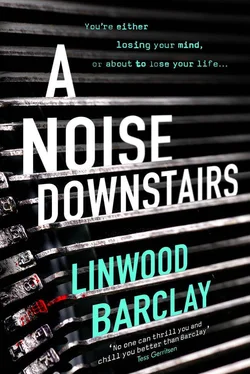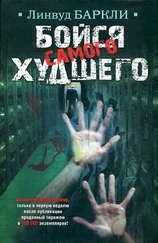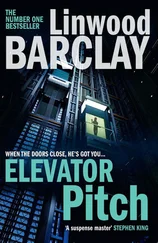Charlotte had the refrigerator open and was saying, “Did you get the vodka?”
Hillary’s text had clearly been a reply to a message from him that read: Can we talk sometime about my return in September?
Paul stared at the message. He had no memory of sending it.
“Earth to Paul,” Charlotte said. “I asked you to pick up a couple of bottles of vodka? The mandarin flavor? I mentioned it last night?”
Paul looked up from his phone. “What?”
“Doesn’t matter,” Charlotte said. “Beer’s fine. You want a beer?”
The drive home. The man in the car. Vodka. A text message to the dean.
Paul wondered what else might have slipped his mind he didn’t even know about yet.
Gavin was breathing so shallowly he was hardly breathing at all.
He didn’t want to wake her.
She was sleeping peacefully in her bed. Her name was Eleanor Snyder and, according to Dr. White’s notes, she was sixty-six, widowed, and retired from her job as an X-ray technician.
Gavin had very little trouble getting into her Westfield Road home. It was a small, story-and-a-half place shaped something like a barn. He’d waited in the bushes across the street for the upstairs lights to be killed, then gave Eleanor another half hour to nod off.
He crossed the darkened street and peered through the window next to the front door, looking for the telltale red glow of a security system panel. He saw none. He then tried the front door, but Eleanor had at least been cautious enough to lock it before she retired for the night. Gavin walked around the house until he found an accessible basement window.
Gavin crawled through and dropped down to the floor. He’d brought along a half-filled garbage bag, knotted at the top with a red, plastic drawstring. He worked his way quietly to the first floor, then found the stairs to the second. He took each step carefully. There was always one that creaked.
And sure enough, one did.
That was when he froze, held his breath, and listened. If Eleanor Snyder heard that creaky step, she’d get up and check it out. But Gavin heard no rustling of covers, no footsteps. What he could make out was soft, rhythmic snoring.
He followed the snores.
And now here he was, standing next to Eleanor Snyder’s bed, looking down at her. There was enough light filtering in through the blinds to make out her flowered nightie, a copy of the latest Grisham on the bedside table. If only all the people whose homes he snuck into wore eye masks and stuffed those little plugs into their ears.
Could she be dreaming? And if so, was she dreaming about Bixby?
Bixby was not her late husband. Aaron had been her husband’s name. Bixby had been her little schnauzer.
According to Dr. White’s notes, after Aaron died, Eleanor funneled all her love — and grief — into that pooch. Bixby got her through those difficult times. It was Bixby who got her back out into the world.
Eleanor walked him around the neighborhood three or four times a day. Bixby didn’t just keep her sane. He kept her in shape. She’d bought one of those extra long leashes that extended and retracted with the push of a button. That gave Bixby freedom to run in short bursts, which Eleanor was no longer up to.
She blamed herself for what happened. It wasn’t really the driver’s fault.
There was no way the driver of the Honda Accord could see that slender leash running horizontally out into the street, or that tiny dog that didn’t even come up to her front bumper.
That had been six months ago.
Eleanor, so said the notes, could not forgive herself.
Gavin watched Eleanor breathe in and out. He’d tied the drawstring on the garbage bag too tight to loosen it, so he made an opening by ripping apart the plastic. Once he’d made a large enough hole, he reached in and took something out. He wadded up the empty bag and stuffed it into the back pocket of his jeans.
Gavin looked about the room for what he needed. It occurred to him to check the back of the bedroom door.
With a gloved hand, he moved the door three-quarters of the way closed. A bathrobe hung from a simple coat hook.
Perfect.
Gavin removed the robe from the hook, let it fall noiselessly to the floor, then replaced it with the item he had brought.
He slipped out of the room, closing the door behind him, thereby ensuring that the first thing Eleanor Snyder would see when she woke up was the surprise he’d left for her.
A small, dead dog. Hanging by its collar.
Anna White woke to a repetitive mechanical sound, something metallic sliding back and forth, as well as a television at very low volume. She threw back the covers, slipped on a robe, and went out into the second-floor hallway. She pushed open the door two down from hers, not worried about disturbing anyone.
“Morning, Dad,” Anna said.
Her father, wearing blue pajamas and slippers, glanced her way and nodded. He was on a rowing machine, his hands firmly gripping the handles, sliding back, pulling his arms, gliding forward, then repeating the motion. Before him, atop the dresser, was a flat-screen television on which Wile E. Coyote was trying, once again, to catch the Road Runner.
Frank White’s eyes were glued to the screen. He grinned. “It’s coming. Where the truck comes out of the tunnel that the coyote painted. It’s simply surreal. Ha! There it is!”
The coyote was flattened.
He cackled, looked Anna’s way again. “Wish to hell I’d worked on that one.” He saw something in her eyes and said, “Did I wake you?”
“It’s fine,” she said.
“Chuck Jones was a genius, Joanie,” he said, looking back at the TV. “I ever tell you what I told Walt when I met him?”
“Yes, Dad,” Anna said. She could not be bothered to correct him about calling her by her mother’s name. “Shall I put on the coffee?”
“Sure,” he said, continuing to row. “I said to him, I said, ‘Walt, even Pepé Le Pew could have kicked Mickey’s ass.’”
“I know, Dad,” she said, and headed down to the kitchen to start the day.
Frank White, Anna had to admit, was something else. Well into his eighties, he was in better shape than she was, at least physically. His arms were roped with muscle and, at 120 pounds, there wasn’t an ounce of fat on the man.
If only he were half as fit mentally.
His short-term memory was slipping away, but his recollections of years past, particularly those youthful ones he spent in California working as an animator at Warner Bros., were rich with detail. He’d retired from that world nearly thirty years ago, at which point Frank and Anna’s mother, Joan, returned to Connecticut.
They filled their first fifteen years back with gardening and travel and socializing, but then Joan’s health began to fail. It was a slow decline, ending in an extended period in a nursing home and finally a chronic care ward. She’d been dead three years now, and Frank had taken it hard.
Anna insisted her father move in with her.
It was not pure altruism on her part. She’d been on her own after she and her husband, Jack, split up two years before her mother’s death. She’d taken back her name and thrown herself into her work, but she’d soon found herself spread thin. Having her father around could actually make her life a lot easier.
During the last few years of Joan’s life, Frank had taken over the running of the household. Did the grocery shopping, made the meals, did the laundry, cleaned the house, kept track of the bills and the finances.
Anna made it clear to her father that taking him in was not some act of charity. He could look after her. She was so busy with her clients, local charitable causes, plus being on the Milford Arts Council, it would be a relief not to have to worry about domestic duties.
Читать дальше









![Линвуд Баркли - Последний выстрел [litres]](/books/412435/linvud-barkli-poslednij-vystrel-litres-thumb.webp)


